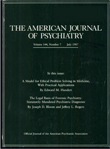Thirty-Month Outcome in Patients With Anorexia or Bulimia Nervosa and Concomitant Obsessive-Compulsive Disorder
Abstract
OBJECTIVE: The present study examines whether concomitant obsessive-compulsive disorder (OCD) indicates a poorer prognosis for patients with anorexia or bulimia nervosa. METHOD: Seventy-five female inpatients who met DSM-IV criteria for anorexia or bulimia nervosa took part in the follow-up study; 29 of these patients met criteria for concomitant OCD. All patients were investigated twice: during inpatient treatment and at follow-up 30 months after discharge. A semistructured diagnostic interview was used as well as the Eating Disorder Inventory and the Hamburg Obsession-Compulsion Inventory—Short Form. RESULTS: At follow-up, 51% (N=38) of the patients no longer fulfilled DSM-IV criteria for anorexia or bulimia nervosa, but this improvement was not significantly correlated with the earlier presence of concomitant OCD. Analysis of variance for repeated measures revealed significant improvement over time on six of the eight Eating Disorder Inventory subscales for all patients regardless of OCD presence. Furthermore, no significant group effects or group-by-time interactions were identified. Clinically significant change, as reflected by improvement in scores on the Eating Disorder Inventory, was seen somewhat more often in patients without concomitant OCD, but this trend was not statistically significant. The patients whose eating disorders were most improved at follow-up also showed the highest reduction of obsessions and compulsions. CONCLUSIONS: The results suggest that concomitant OCD does not indicate a significantly poorer prognosis for patients with anorexia or bulimia nervosa. (Am J Psychiatry 1998; 155:244–249)



